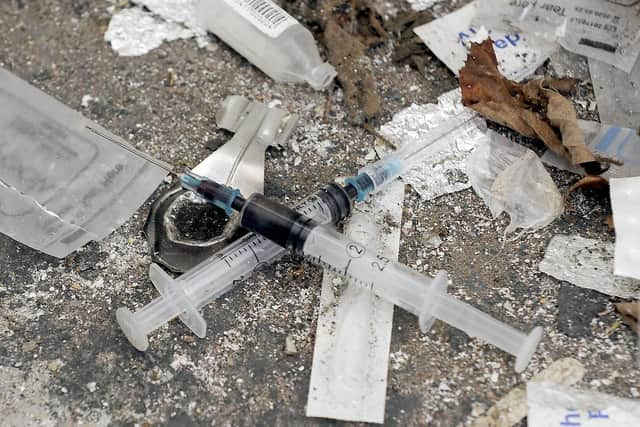Drugs death taskforce would be scrapped under Bill consultation launched by Scottish MSP
As a volunteer with Peter Krykant’s unofficial OPC, a converted ambulance that operated for nine months in Glasgow, Labour MSP Paul Sweeney witnessed lives being saved by the administering of Naloxone – the antidote to a heroin overdose.
As the country’s drug death toll soared, reaching a grim record of 1,339 in 2020, he sought to find a way through the impasse between the UK and Scottish governments over the legality of such facilities.
Advertisement
Hide AdAdvertisement
Hide AdHis proposal for a Drug Deaths Prevention (Scotland) Bill comes at a time when progress is finally being made and discussions on a pilot OPC run by the Glasgow City Health and Social Care Partnership (GCHSCP) are thought to be well underway.


But the Bill would establish a framework for such facilities to be rolled out across the country.
Mr Sweeney said: “The assumption has been that an OPC cannot be set up without specific consent from the Home Office. This is the point of contention the Bill is seeking to address. In the light of Peter [Krykant’s] pilot, there is no legislative impediment. What we need to do is to put in place the infrastructure to allow them to be established officially.
“It’s creating a similar legislative framework to how a needle exchange operates – a licensing system which allows HSCPs to set them up with regulations governing their operation and use.”
Under Mr Sweeney’s proposals, the Scottish Drug Deaths Taskforce would also be replaced with a Scottish Drug Deaths Council (SDDC).
Set up in July 2019, the taskforce has previously been criticised as a “talking shop”. In January, its chair, Professor Catriona Matheson, resigned after members were asked to submit conclusions to their work six months earlier than initially suggested.
“We would abolish the Scottish Drug Deaths Taskforce because it has not delivered in the three years since it was set up,” Mr Sweeney said. “There have been all sorts of controversies. A big criticism has been a lack of lived experience on the board.
"There has been a patronising elitism about it. Those concerns would be addressed and the new body would have statutory independence from government.”
Advertisement
Hide AdAdvertisement
Hide AdThe Drug Deaths Prevention Bill would require the new body to include stakeholder organisations, medical professionals, drug users and those in recovery. Meetings would be held quarterly and minutes published.
Mr Krykant launched his van in September 2020 after the Home Office ruled a fixed OPC planned for Glasgow city centre was illegal because possession of Class A drugs was an offence under the Misuse of Drugs Act 1971.
While the Scottish Government supported such facilities, the-then Lord Advocate James Wolffe declined to grant immunity from prosecution, so little progress was made. But in November, the new Lord Advocate, Dorothy Bain, said those caught in possession of Class A drugs could now be given a police warning or referred on to other services.
Last month, an evaluation of Mr Krykant’s van carried out by researchers, including Andrew McAuley of Glasgow Caledonian University, concluded it was feasible for an OPC to operate successfully in the UK without being shut down by the police or with negative consequences for the community.
Mr Sweeney said these developments, along with growing cross-party support for OPCs, meant he was optimistic such facilities would open in Scotland. “I think we are now in a position where it is all starting to come together and this helps to lay another paving stone on the road to getting it working,” he said.
Drugs policy minister Angela Constance said: “The Drug Deaths Taskforce was established to provide expert advice on the emergency response to rising drug-related deaths in Scotland. The experts are significant contributors to the National Mission to improve and save lives and will submit their final reports by the end of July.
“I look forward to seeing the full detail of the Bill consultation and, as with anything which might help us in addressing this crisis, I will give it a fair and sympathetic hearing.”
The consultation on Mr Sweeney’s proposals will run until at least August 17 after which a draft Bill will be drawn up.
Comments
Want to join the conversation? Please or to comment on this article.